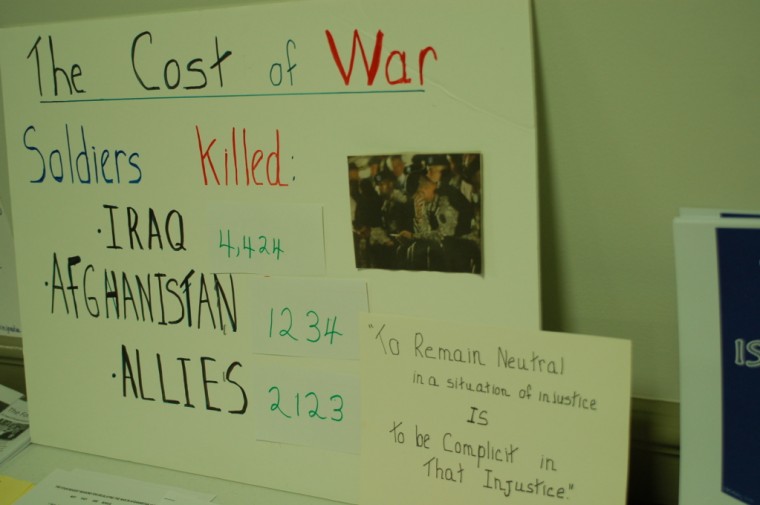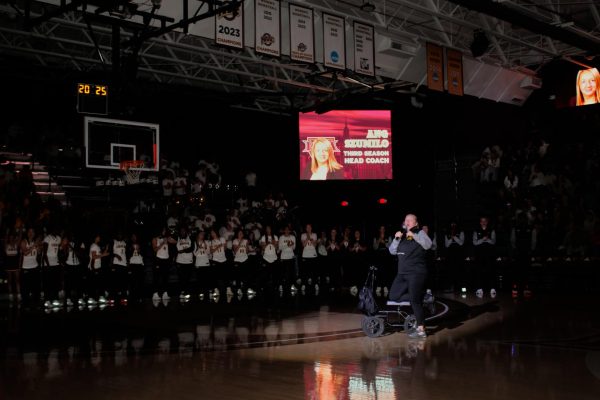Panelists try to answer “Why are we there?” about U.S. wars
October 12, 2010
The ongoing war in Afghanistan and the United States’ continued occupation in Iraq are arguably the most controversial issues in today’s society. Americans are divided over a withdrawal from the Middle East or a continuation of our presence there.
The U.S.-Iraq Status of Forces Agreement is currently in effect but many wonder if it will be carried out, abandoned or altered.
“Why are WE there?,” a discussion of the continuing U.S. occupation of Iraq and the ongoing war in Afghanistan, was held in Romita Auditorium of Ryan Library on Oct. 6. Dahlia Wasfi, medical doctor and activist, Raed Jarrar, peace action political consultant, and Matt Southworth, FCNL & Iraq War Veteran, came to give their views on why the U.S. is present overseas and offer solutions to the problem. The attendees were largely made up of faculty and elder members of the New Rochelle community.
Wasfi, born in Iraq and raised there for five years, was the first to speak. Wasfi has made two trips to visit extended family in Iraq since the U.S. shock and awe invasion in 2003. She is an activist who shares her personal experiences and unedited graphic photos, and speaks out in support of an immediate withdrawal of U.S. troops in Iraq.
Wasfi makes it a point in her lectures to share horrifically graphic pictures of dead and maimed U.S. soldiers, because they are the real images seared into the memories of Iraqi children, not the edited ones found in mainstream media. Wasfi believes there to be three reasons for our occupation in Iraq: money, oil and Israel.
She argues that corporations are receiving profits and benefitting from the war while U.S. soldiers and Iraqi citizens are not receiving a heavy influx of money. Wasfi believes that oil interests and strong U.S. political ties to oil are another reason for our presence in the struggling country.
Lastly, Wasfi believes the U.S. invasion of Iraq was done as a way to collaborate with Israel to overtake Iran. Because of the huge recompense Iraq pays for U.S. occupation in their country, and the strong personal and familial ties she has with Iraq, Wasfi advocates for the “immediate and unconditional withdrawal of soldiers, marines, CIA and mercenaries” from Iraq.
Following Wasfi’s fervent speech, Jarrar gave his political analysis of the situation. While Jarrar supports the withdrawal of U.S. troops from Iraq, his solution is less immediate than Wasfi’s.
Jarrar places most of his faith in the U.S.-Iraq Status of Forces agreement, which states that U.S. combat forces with withdrawal from Iraq by June 30, 2009 and all U.S. forces will vacate by Dec. 31, 2011. However, he fears that a loophole will be found that relieves the U.S. state department from carrying out the agreement.
Jarrar’s stance on the issue is somewhere in the middle. He was not as drastic as Wasfi when advocating for the immediate withdrawal of troops, but he does support their evacuation altogether.
“The situation in Iraq is really, really bad. Iraq is a broken country with a corrupt government. The only way for us as Americans to help Iraqis is not to go there and rebuild their democracy. The only way to help Iraqis is to end our occupation in Iraq,” he said.
Matt Southworth was the last to speak, and he recounted his traumatic experience as a soldier in Iraq. Southworth arrived there intending to fight for Iraqi freedom and democracy, but after two months began to feel disillusioned.
He spoke of inhumane U.S. treatment toward Iraqi citizens and shocked his audience with his reasons for U.S. occupation in Iraq. Southworth’s personal belief of oil, money and political interests is consistent with Wasfi’s. More than his reasons for why the U.S. is there, Southworth gave ardent reasons for why the U.S. is not there.
“We are not there to free the Iraqis–we are an occupier and oppressor, even those with the best of intentions,” he said.
“Why are WE there?” was a controversial yet necessary discussion. It is important to talk about debated issues, and raise awareness for matters that affect the U.S. and the world.




